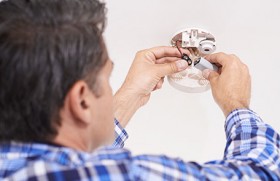Tips to Help Prevent Carbon Monoxide Poisoning
CO is a colorless, odorless gas produced by the incomplete burning of any carbon-containing material, including gasoline, natural gas, propane, coal or wood. CO is dangerous because it replaces oxygen in the blood and interferes with the transport of needed oxygen to cells in the body.
Carbon Monoxide Safety Tips
Many incidents involving carbon monoxide poisoning can be prevented — with the right preparation. Start with these seven tips to help keep your home and family safe from carbon monoxide.
- Know the risks of carbon monoxide.
Anything that burns a fuel — such as a furnace, fireplace or generator, gas appliance or car — produces a toxic by-product: carbon monoxide (CO).When these devices are properly maintained and vented, this colorless, odorless gas can be effectively dispersed and channeled out of your home. If not, inhaling carbon monoxide can trigger serious health issues.
At lower concentrations, victims may experience such symptoms as a headache, dizziness, weakness, nausea, vomiting, chest pain and confusion. But at higher concentrations, CO can quickly cause a loss of consciousness, even death.
- Keep your vents clear.
During and after a storm, make sure nothing is obstructing the outside stack or vent for your dryer, stove, furnace and fireplace.Take special care to prevent snow from building up and blocking these critical exits for dangerous gases.
- Do not run engines in a closed area.
Proper ventilation is critical to avoiding CO poisoning. So do not start a car, fire up a grill or stove, or run a generator in a closed area — like a basement or garage.Even if you leave the garage door open, carbon monoxide gas can quickly build up to toxic levels.
- Schedule regular maintenance.
Make sure you rely on experts to install your fuel-burning devices and set up the appropriate venting for each device.At least once a year, have a qualified professional inspect your fuel-burning devices to make sure they continue to operate properly.
- Keep fireplaces clean and well vented.
If you have a wood-burning fireplace or stove, make sure you keep it clean and that the flue is working properly.Even if the last embers are just smoldering, keep that flue open to let the gases escape.
- Install CO alarms.
If you have fuel-burning appliances, a fireplace or an attached garage, consider installing these special devices in your home. You will want one on every level (including the basement), within the vicinity of each sleeping area and in other locations required by any applicable laws/building codes.Some CO detectors can even be interconnected across your house, so that when one detects an issue, they all sound the alarm. If you do hear the CO alarm, immediately move to fresh air and call 911.
- Maintain your CO alarms.
Keep in mind that CO alarms do need to be maintained regularly.Many come equipped with a battery backup to ensure uninterrupted operation, even if the power goes out. But you will need to remember to change your batteries at the frequency recommended by the manufacturer, like you do with your smoke detectors.
It is also a good idea to keep a supply of batteries on hand in the event of a multi-day power outage. Other maintenance tips to consider are removing visible dust with a vacuum, and testing and replacing units (check your owner’s manual for details).
It’s important to have the right homeowners insurance to protect the things you value. Contact your agent to make sure you’ve got the coverage you need.
*Centers for Disease Control and Prevention, http://www.cdc.gov/mmwr/preview/mmwrhtml/mm6030a2.htm
This content is for general information only. It is not intended to provide legal, technical or other professional advice, nor is it an endorsement of any particular product. In no event will Travelers or any of its subsidiaries or affiliates be liable in contract or in tort to anyone for the accuracy or completeness of this information. Laws, regulations, standards or codes may change from time to time, and you should always refer to the most current requirements. This information does not amend, or otherwise affect, the provisions or coverages of any insurance policy issued by Travelers, nor is it a representation that coverage does or does not exist for any particular claim or loss under any such policy.
Recent Posts
How to Identify and Help Remove an Ice Dam
Sometimes, even your best efforts to prevent an...How to Help Prepare Your Boat for Spring
Are you one of the millions of boaters with spr...Space Heater Safety Tips
In order to save money in the colder months, ma...Umbrella Insurance Coverage
Umbrella insurance provides extra liability cov...5 Tips to Protect Your Possessions with Valuable Items Insurance Coverage
You may think that a homeowners insurance polic...

